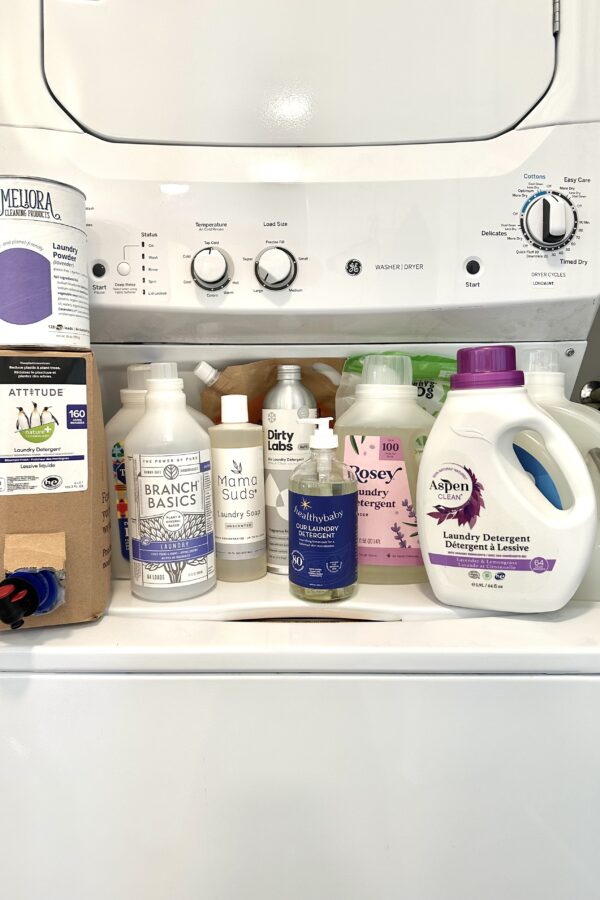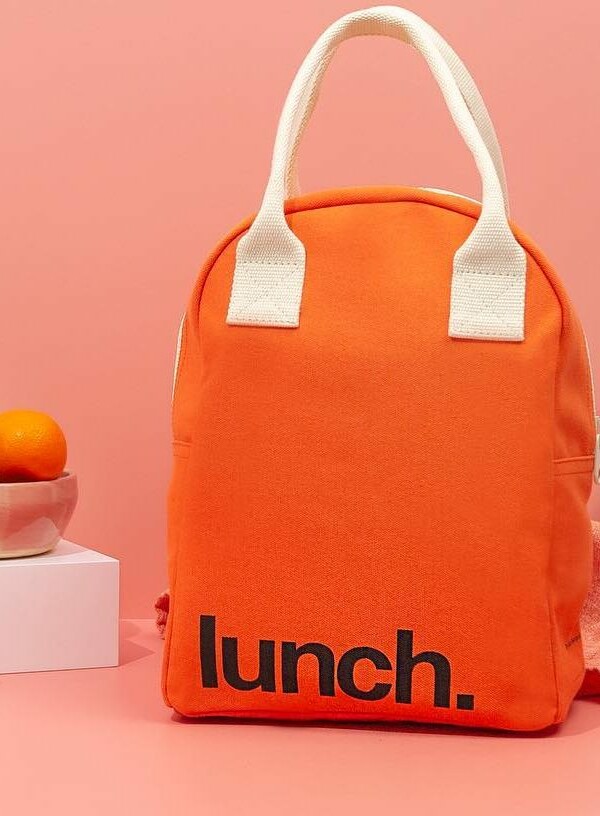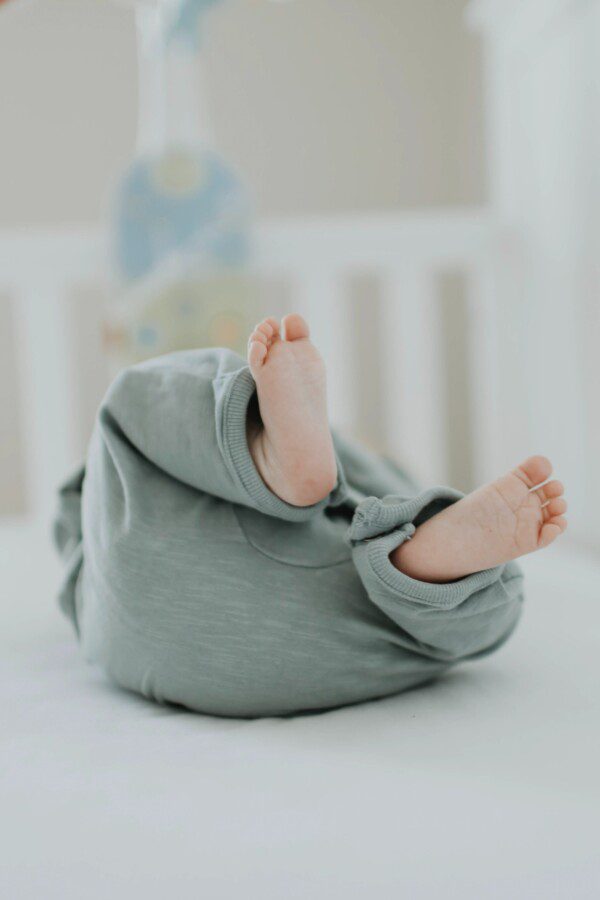Transitioning to an organic and low-tox wardrobe is definitely a process.
Choosing non-toxic and organic clothes is crucial for people with allergies and skin sensitivities, but considering all of the different chemicals that are added to clothing throughout the manufacturing process, buying safer textiles can be beneficial for anyone’s longterm health.
To reduce stress, I recommend you build your low-tox wardrobe gradually. As your old clothes wear down, you can find healthier brands to buy from as you replace each garment, piece by piece.
In this specific guide, I’m helping you find cozy, non-toxic, and organic sweaters and cardigans for the whole family!
P.S. If you’re looking for other cozy, organic accessories for the fall and winter, check out our articles on natural and organic scarves, hats & beanies, gloves & mittens, and sweats.
Table of Contents
- The Best Brands for Organic Sweaters and Cardigans in 2024
- Pact (Certified Organic & Fair Trade Sweaters for Women & Men)
- Rawganique (Organic Knitwear for Chemically-Sensitive Folks)
- Tentree (Organic Cotton & Wool Sweaters for Adults)
- Monica + Andy (Organic Cotton Sweaters for Babies & Kids)
- wearwell (Sustainable Clothing Marketplace & Membership)
- ABLE (Size-Inclusive Cotton Sweaters & Cardigans)
- Everlane (Cotton & Wool Sweaters for Adults)
- L.L.Bean (Organic Cotton Sweaters for Men)
- Kowtow (Organic & Fair Trade Sweaters & Other Knitwear)
- Frank & Oak (Organic & Sustainable Sweaters for Men & Women)
- Amour Vert (Organic Cotton & Wool Sweaters for Women)
- Maisonette (Sweaters for Babies & Kids)
- Bare Knitwear (Natural Alpaca Wool Sweaters)
- Seasalt Cornwall (UK-Based Organic Sweaters for Women)
- Why Buy Organic Sweaters and Cardigans? (What Fabrics & Finishes to Look For)
- Non-Toxic Dyes & Finishes
- Wrapping It Up
This post contains affiliate links, which means we may earn a small commission if you choose to make a purchase.
Featured Image Credit: Pact
The Best Brands for Organic Sweaters and Cardigans in 2024
To find out more about what to look for in non-toxic, organic, and sustainable sweaters, scroll down to the bottom of this article.
But for now, let’s get right to our favorite brands to bring some organic coziness to your wardrobe this winter:
Pact (Certified Organic & Fair Trade Sweaters for Women & Men)
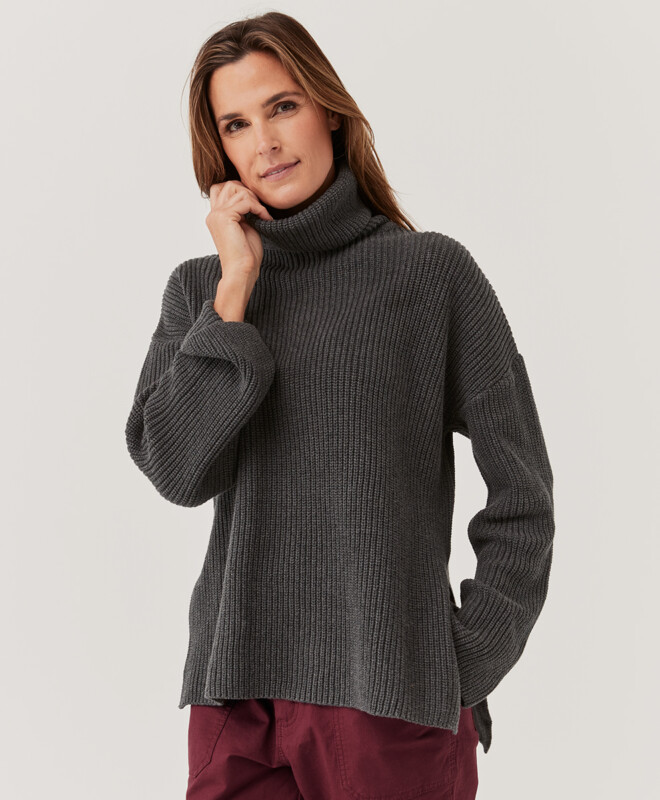
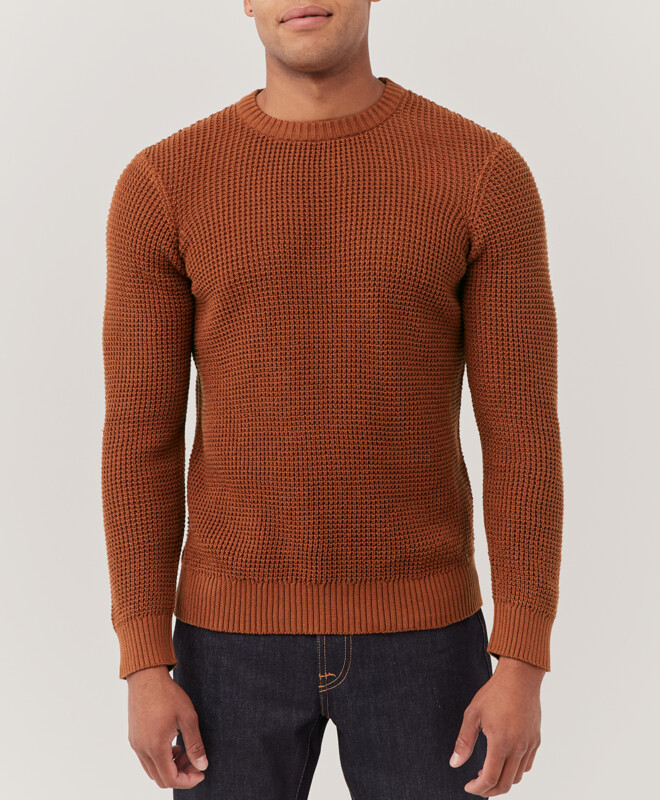
Price Range: $92-$135
Size Range: XS-2XL
Materials: GOTS certified organic cotton
Pact is one of the best sustainable clothing brands for affordable, organic cotton apparel and underwear. (You might notice that we feature them a lot!) Their Fairtrade certified sweaters are made with 100% certified GOTS organic cotton.
Although they have a larger selection of organic sweaters for women (including turtle necks, crew necks, cardigans, and more), they also have a selection for men (including zip-ups).
Use the code THEFILTERY15 for 15% off full-priced items.
Rawganique (Organic Knitwear for Chemically-Sensitive Folks)


Price Range: $44-$139
Size Range: XS-XXL
Materials: Organic cotton, hemp,
Rawganique is a clothing, accessories, and home goods brand that takes non-toxic manufacturing very seriously. Their sweaters and cardigans for men and women are made in the U.S.A. out of 100% organic cotton or hemp and are completely free from toxic dyes.
Tentree (Organic Cotton & Wool Sweaters for Adults)
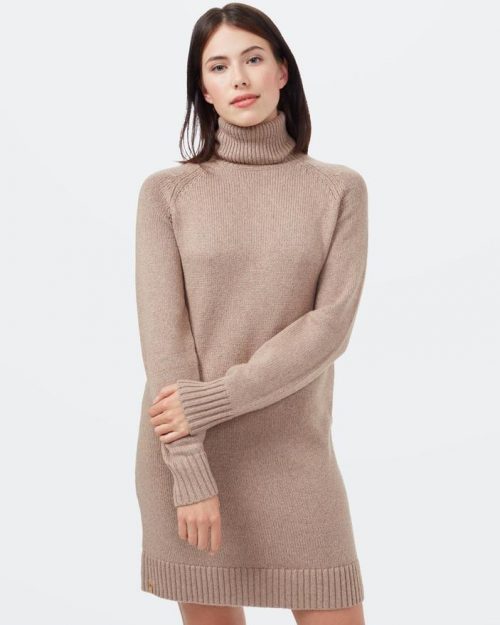

Price Range: $34-$128
Size Range: XS-XL
Materials: Organic cotton, wool, recycled synthetics
Some of Tentree’s ethically made sweaters are made from 100% organic cotton, while others are made from soft blends of organic cotton, wool, and recycled synthetics. (So just make sure to check the product details before purchasing to make sure you’re getting what you want.)
For women, they have sweater dresses, cardigans, crew necks, and more. For men, they offer crew neck sweaters, quarter-zips, cardigans, and more. They don’t have sweaters for kids, but they do have a collection of sweatshirts and hoodies (which are made out of various materials like organic cotton, hemp, TENCEL, and recycled synthetics).
Tentree is also a Climate Neutral and certified B Corp brand that plants trees with each purchase and tries to decrease their environmental impact whenever possible.
Monica + Andy (Organic Cotton Sweaters for Babies & Kids)
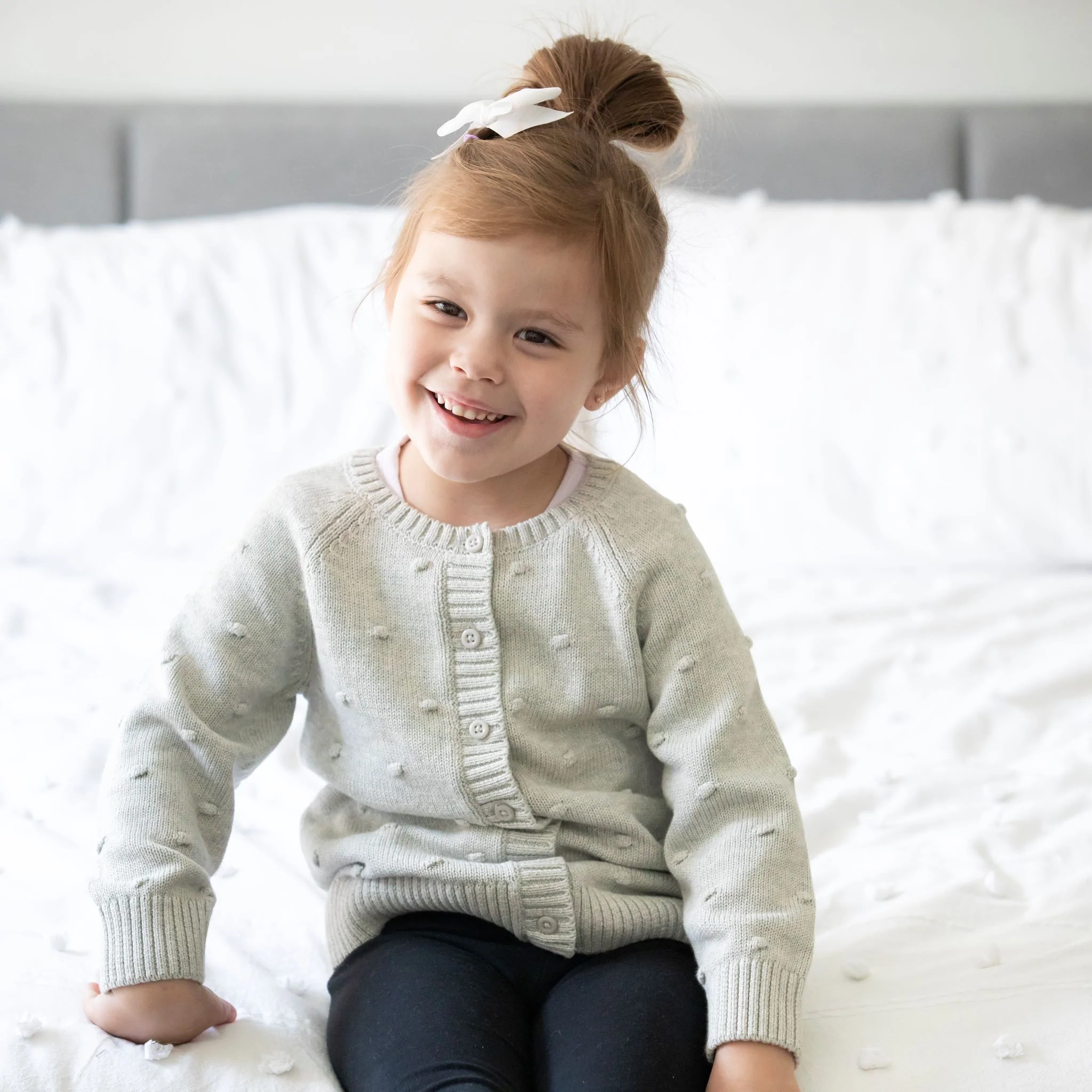
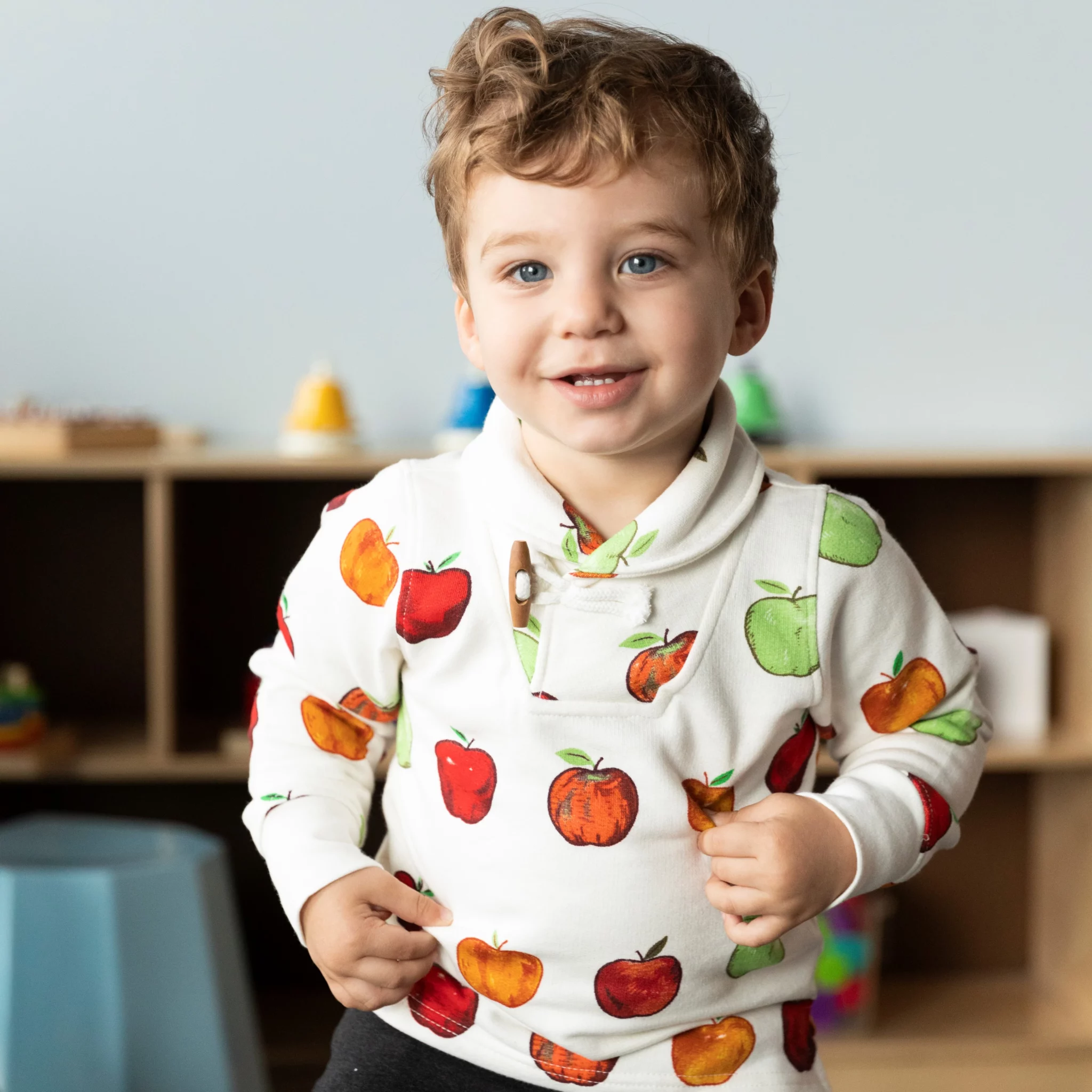
Price Range: $11 – $38
Size Range: Babies (0-24 months), Toddlers (2-5T), and Kids (5-10Y)
Materials: Organic cotton
Monica + Andy is one of the best places to get super cute sweaters and sweatshirts for the littlest ones in your family. They’re made out of 100% GOTS certified organic cotton and free from all the toxins you don’t want near your kids.
They have classic solid colored sweaters and cardigans as well as lots of seasonal sweatshirts with fun prints.
Arms of Andes (Plastic-Free Wool Zip-Ups & Base Layers)
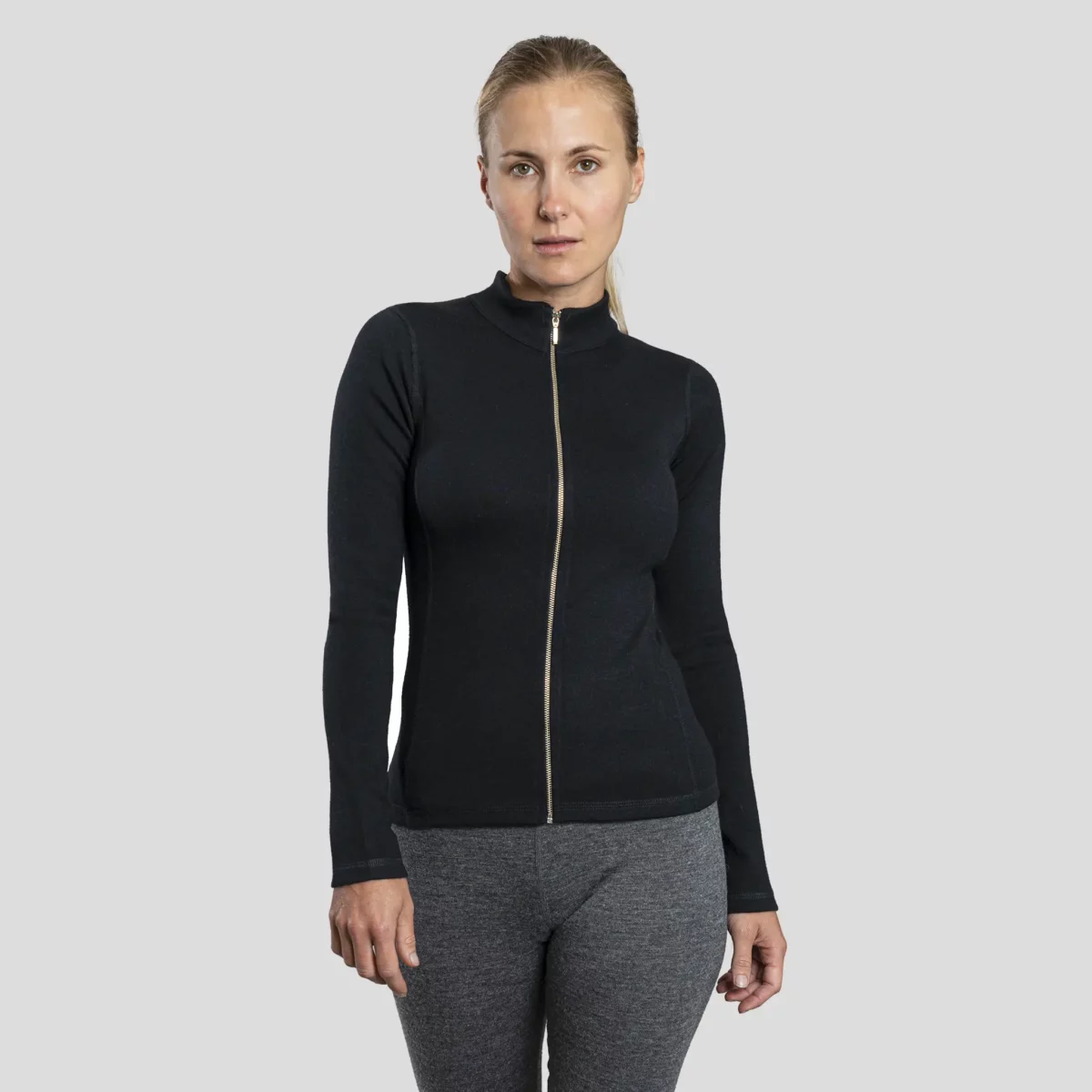
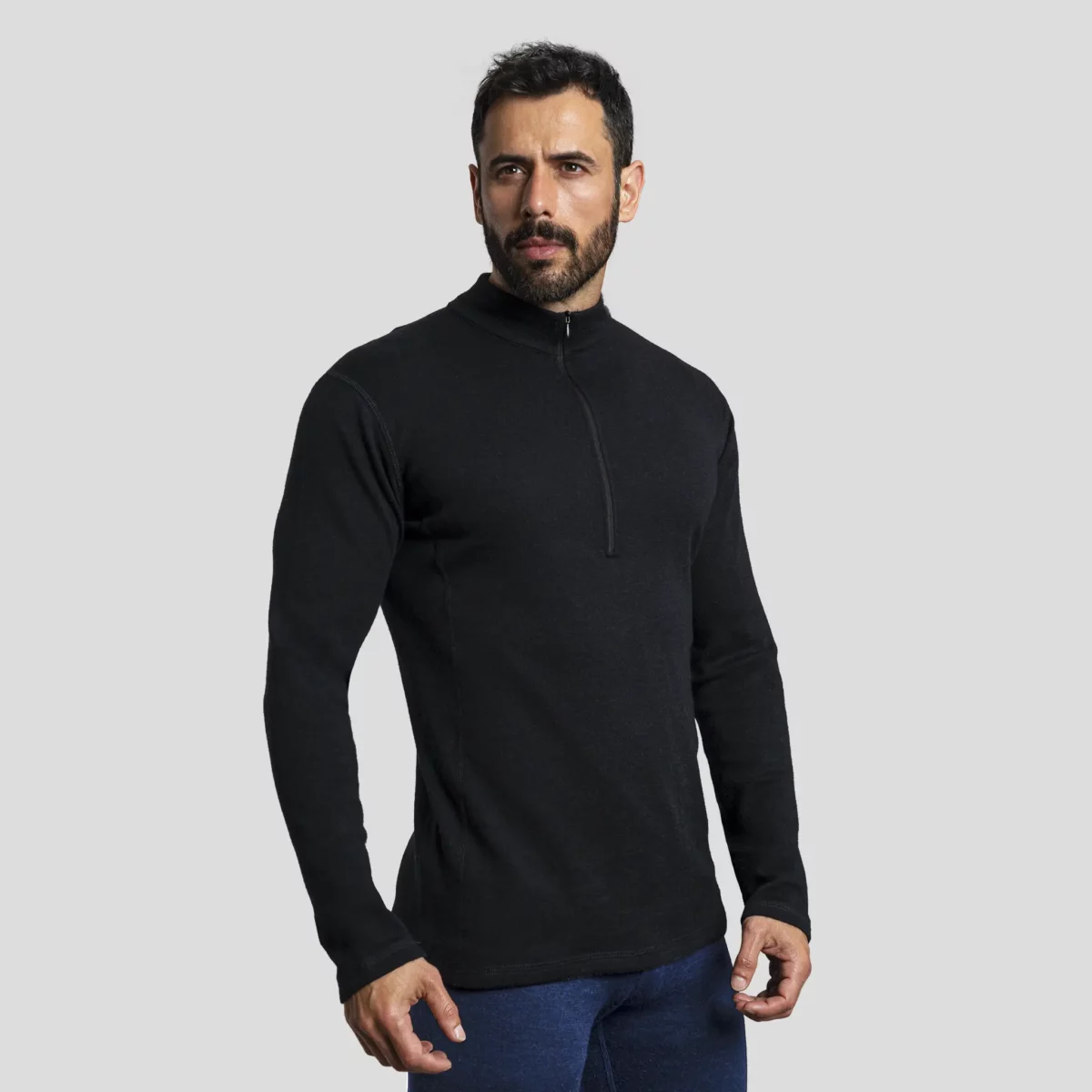
Price Range: $95-270
Size Range: XS-XL
Materials: All-natural Alpaca wool
Arms of Andes is a sustainable clothing brand that is 100% plastic-free. It’s made out of alpaca wool, which is naturally breathable and moisture-wicking (without any toxic chemical treatments!).
Their focus is on wool performance garments that are especially functional for hiking and other outdoor activities. In addition to their tees, underwear, and accessories, they also carry a selection of long-sleeved base layers, zip-ups, and jackets.
For the colors, you can choose if you want all-natural dyes or if you want low-impact synthetics.
Arms of Andes’ has a “Leave No Trace Apparel” initiative, which means that all of their clothing is made out of completely biodegradable fabric (with the exception being their zippers, which is something they’re working on). They’ve even managed to switch to 100% natural rubber for their elastic bands!
Plus, they’ve got a “single-origin supply chain,” which means they carry out every stage of production—from sourcing alpaca fiber to manufacturing the garments—in one country: Peru. Their ethically-sourced alpaca wool comes directly from herders in the Peruvian Andes, whose families have been employing traditional techniques to rear alpacas and harvest their fiber for generations.
wearwell (Sustainable Clothing Marketplace & Membership)
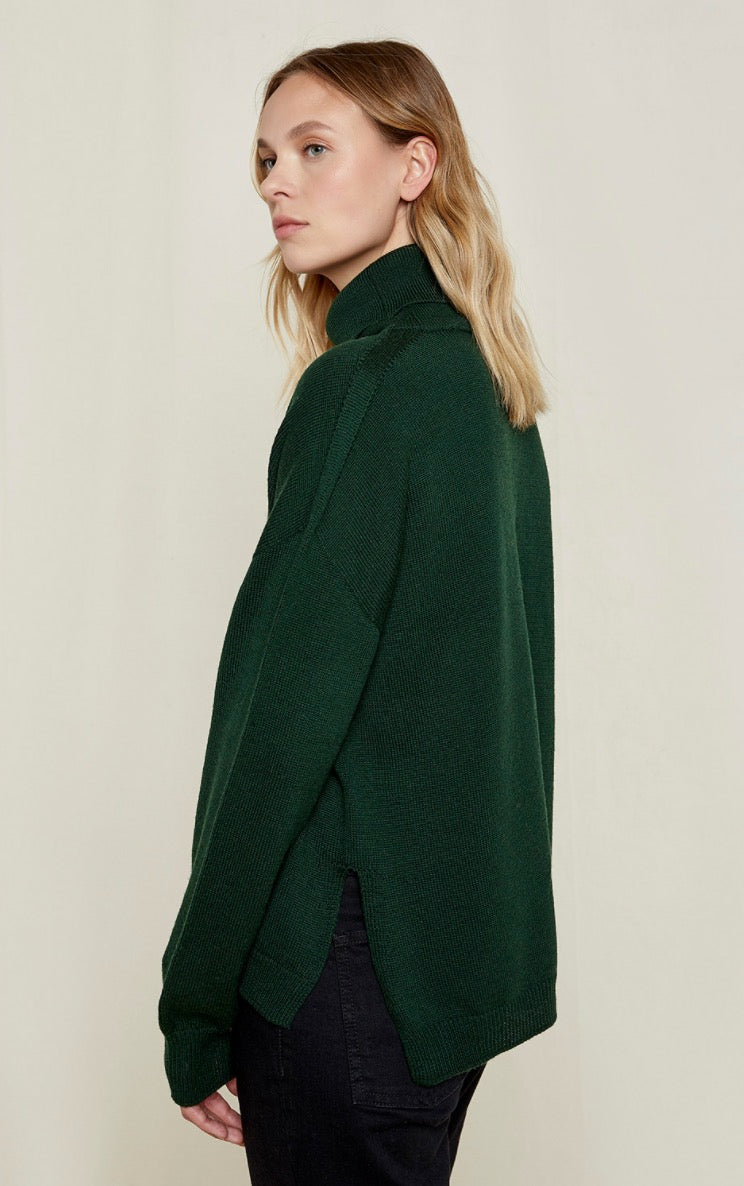
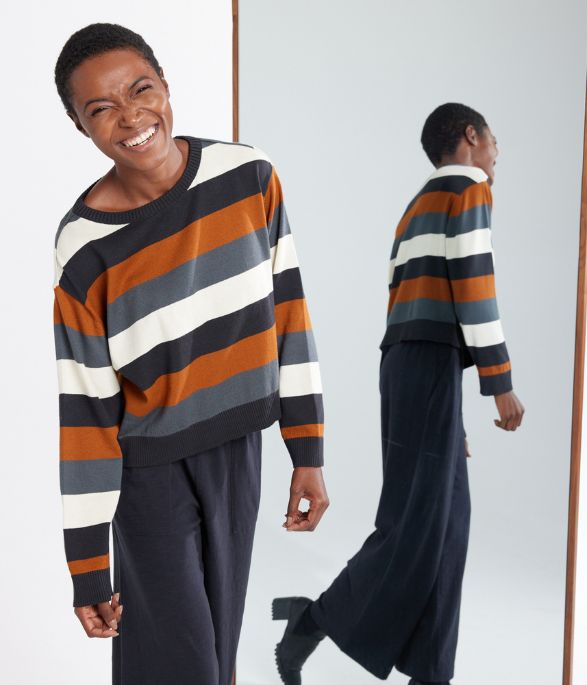
Price Range: $25 (on sale) – $217
Size Range: 2XS-3XL
Materials: Organic cotton, natural/organic wool, & others
wearwell is an online marketplace that curates ethically-made and eco-friendly clothing and accessories for women.
Although not everything in their shop is made from totally organic materials, a lot of it is! And everything they carry has been vetted for various other conscious initiatives, such as supply chain transparency.
What really makes wearwell unique, however, is its membership and personal styling services. You can either sign up for a month-to-month or an annual membership, where you’ll get perks like:
- 10% off every order
- Free shipping & returns
- Access to FREE personal styling services
- and more
And to make things even more sustainable they have a #wearwellagain Secondhand Shop as well!
ABLE (Size-Inclusive Cotton Sweaters & Cardigans)
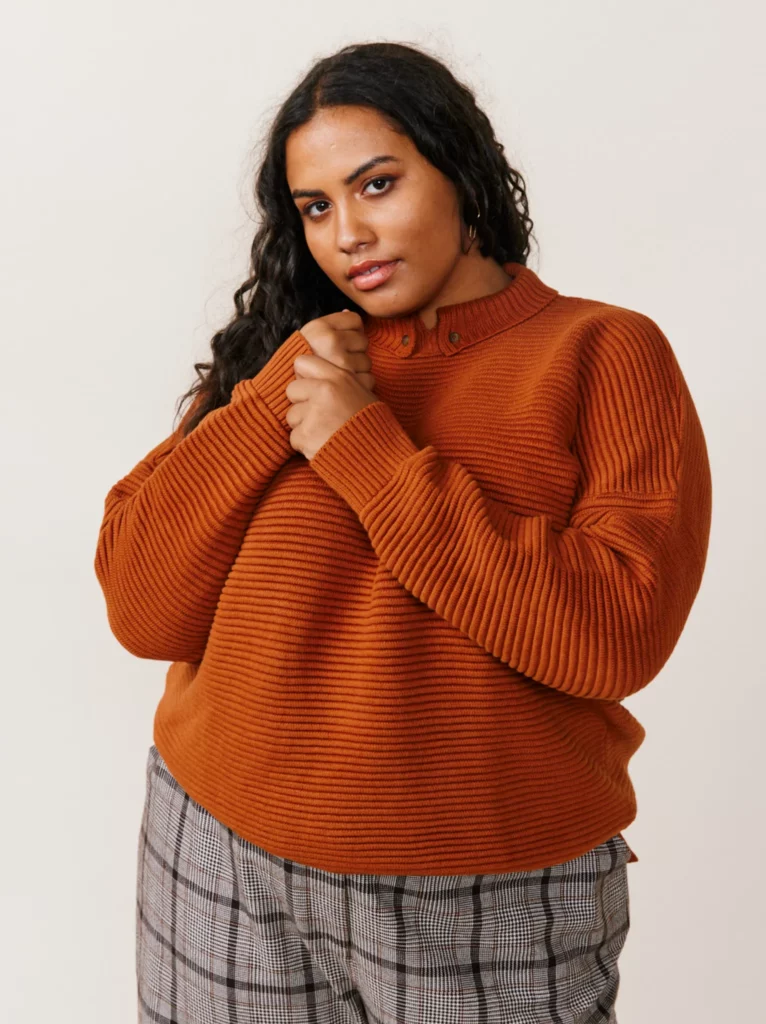
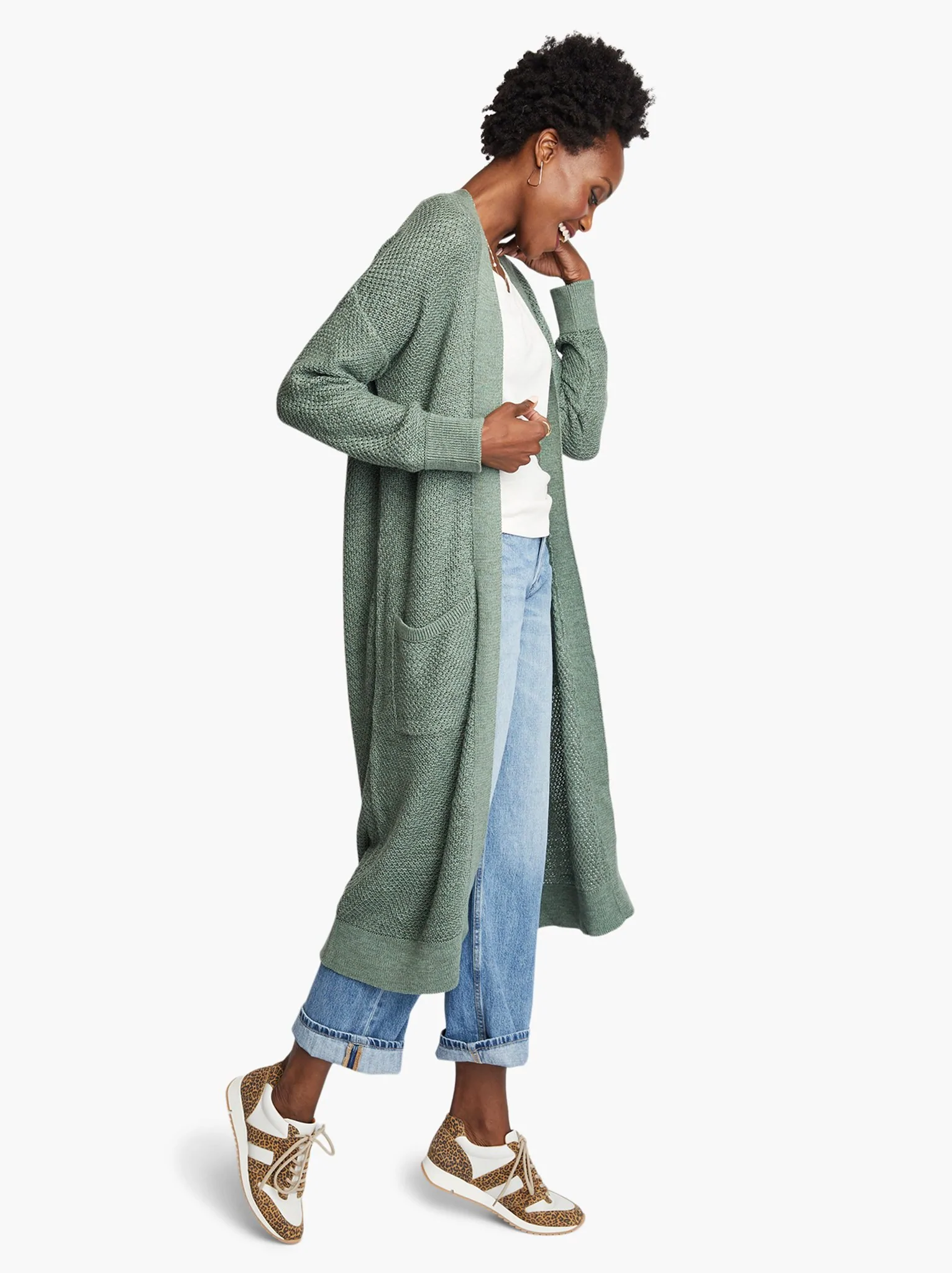
Price Range: $43-$158
Size Range: XXS-3XL
Materials: Organic cotton, BCI cotton, conventional cotton, and recycled synthetics
ABLE is a Fair Trade fashion brand “that employs and empowers women as a solution to end poverty.” They have one of the most size inclusive collections on this list, ranging from 2XS to 3XL.
ABLE carries various styles of women’s sweaters, including pullovers and cardigans that are available in classic solid colors and more vibrant patterns. They also make it easy to sort according to fit, so you can filter according to “bust-friendly,” “bump-friendly,” “nursing-friendly,” and more.
Many of their sweaters are made out of 100% organic cotton, but they also use some Better Cotton Initiative (BCI) cotton (which is kind of like a transition between conventional and organic), conventional cotton, and some recycled synthetic fabrics as well—so just make sure you check the product details before buying.
Everlane (Cotton & Wool Sweaters for Adults)
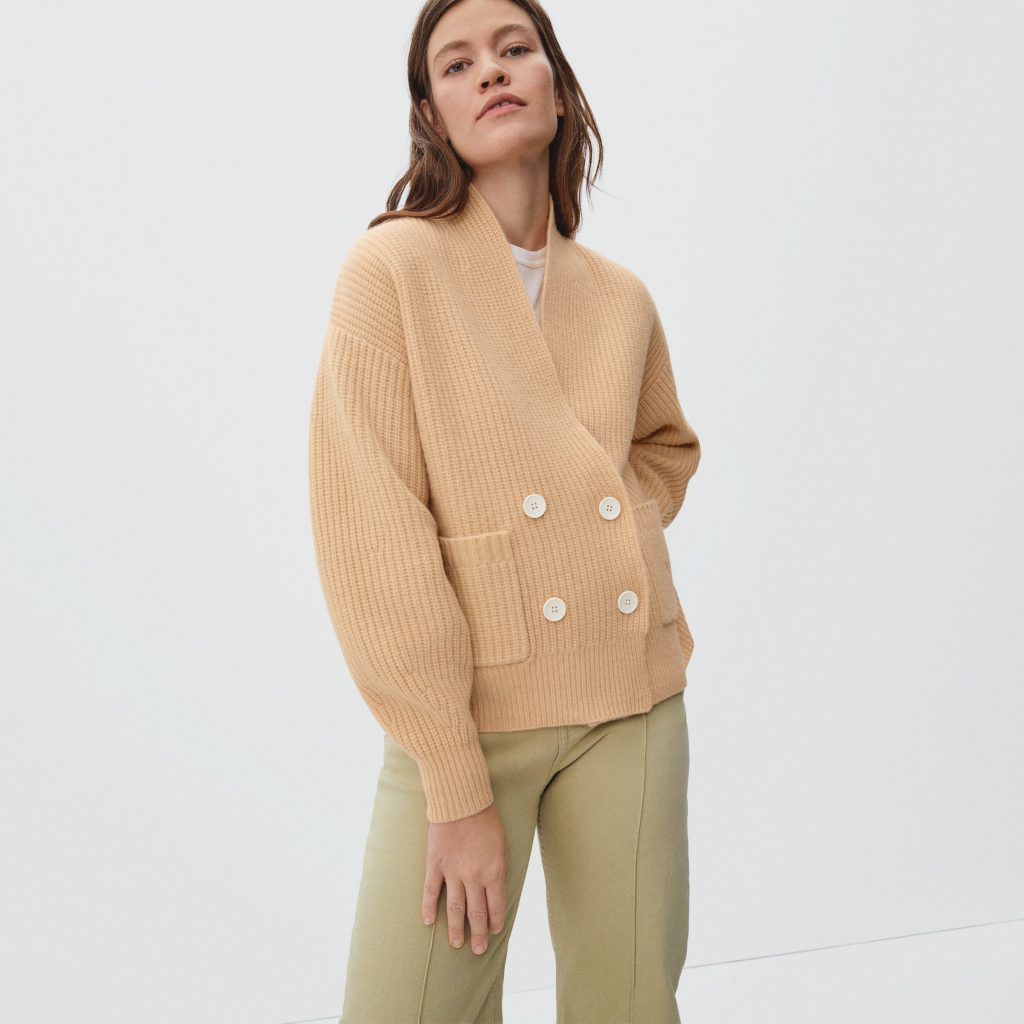
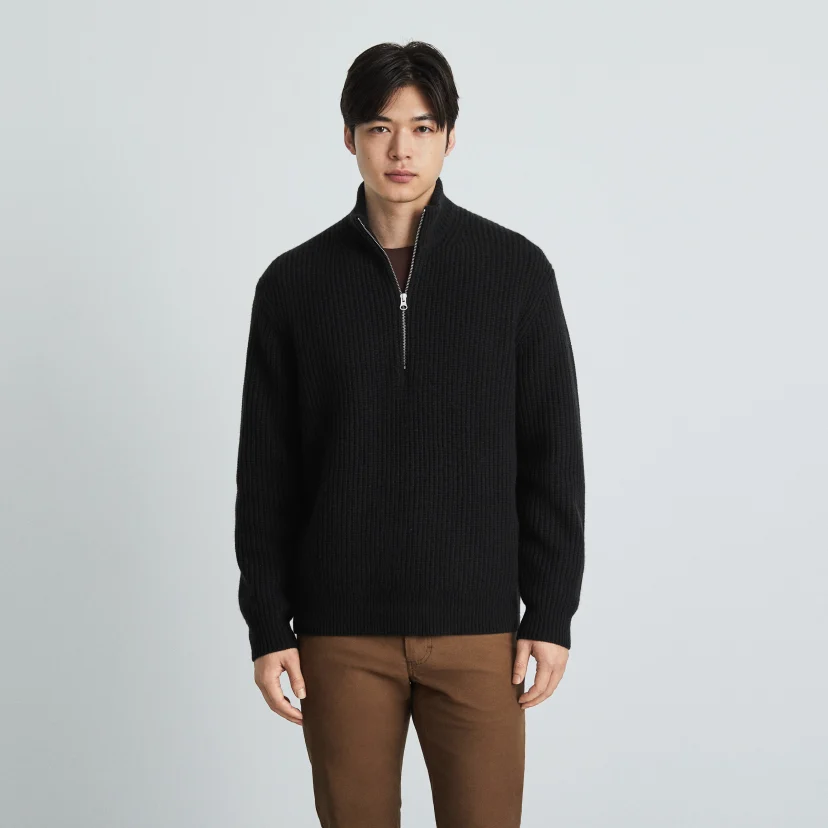
Price Range: $88-$178
Size Range: 2XS-2XL
Materials: Organic & conventional cotton; alpaca, cashmere, & merino wool (including recycled), recycled synthetics
Here’s another brand that offers a variety of sizes and styles for adults of all genders. Everlane makes a variety of different types of sweaters for both men and women. They have zip- and button-up cardigans along with pullovers, sweater vests, and more. They come in solid colors as well as fun patterns.
Although the majority of Everlane’s sweaters are made out of natural and organic materials like cotton and wool, they do use some (mostly recycled) synthetic materials too, so just make sure to double-check.
L.L.Bean (Organic Cotton Sweaters for Men)
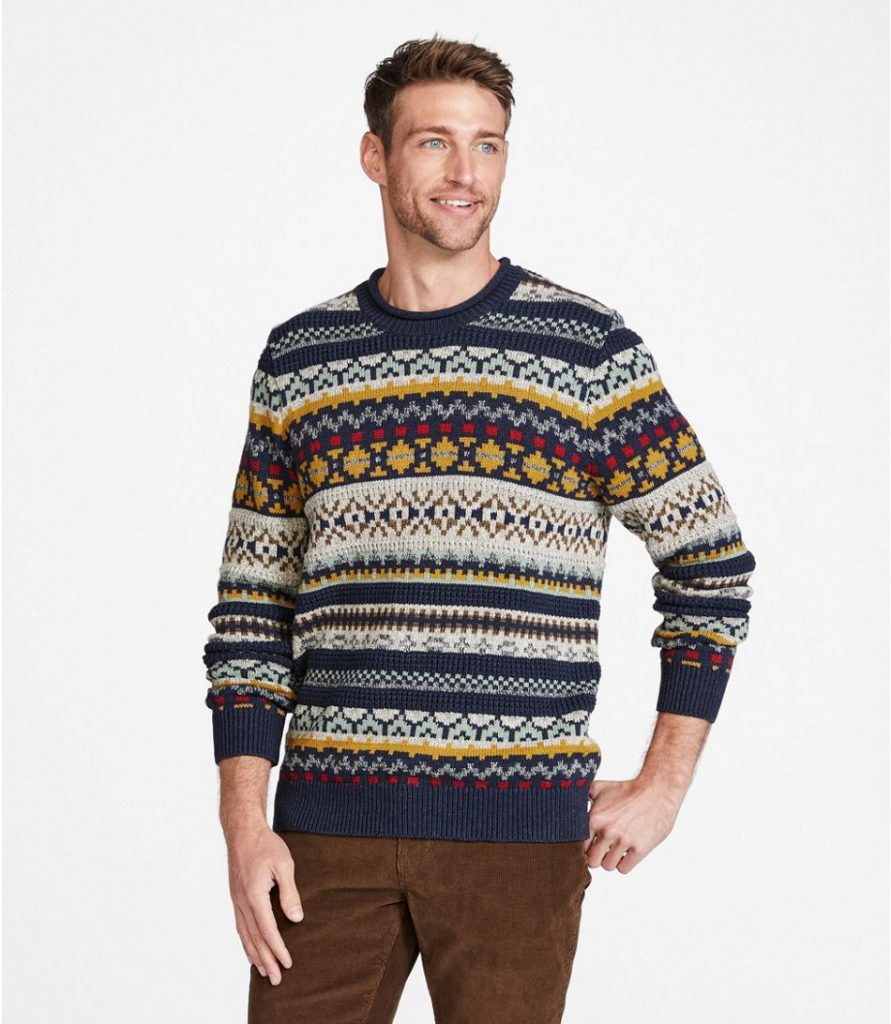
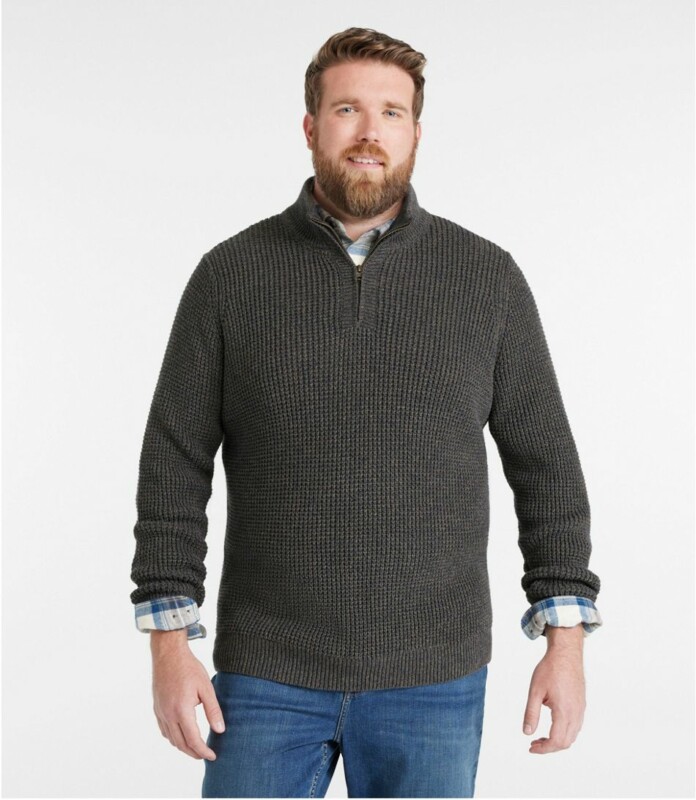
Price Range: $50-$129
Size Range: S-3XL (including Tall)
Materials: Organic cotton (& others)
L.L.Bean is another great place to find durable and cozy organic sweaters for men. They carry both heavy and lightweight pullovers, quarter-zips, and full-zips made from 100% organic cotton.
Although their organic collection isn’t huge, we’re including them here because they carry some of the most inclusive sizing for men, including 3XL and Tall sizes. They’re pretty affordable, too!
Kowtow (Organic & Fair Trade Sweaters & Other Knitwear)
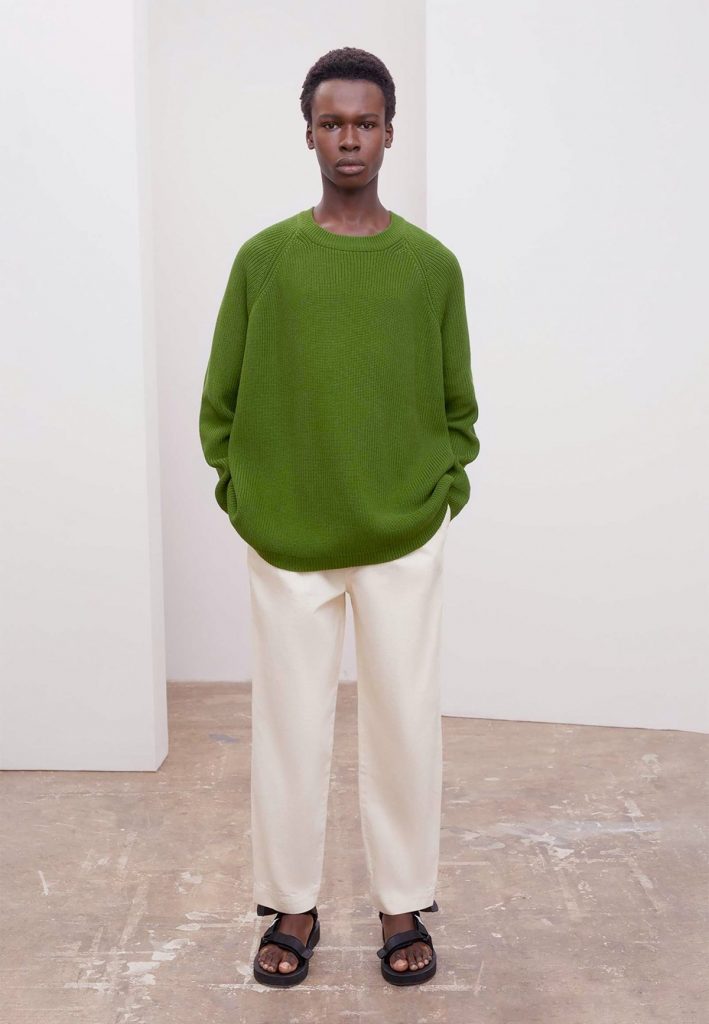
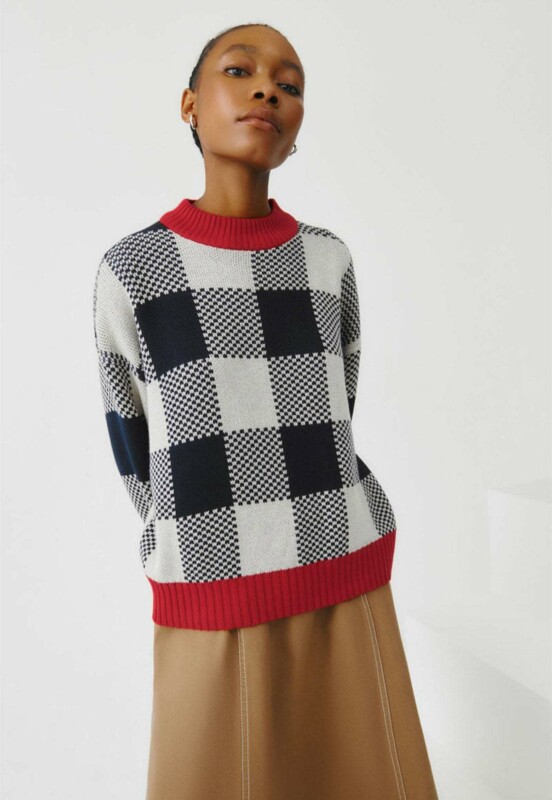
Price Range: $30 – $259
Size Range: 2XS-2XL
Materials: Organic cotton
As a brand, Kowtow is committed to sustainability and ethics throughout its entire supply chain. They use 100% fair trade certified organic cotton and ensure that their employees in Kolkata, India receive fair wages and employee benefits for their work. Their truly beautiful pieces are not only versatile and comfortable but they’re made to last a long time.
They have a wide variety of classic, solid colored sweaters as well as bold prints and patterns. They have crew necks, puffy-sleeved sweaters, oversized cardigans, wrap or button up cardigans, turtle necks, and more. Although most of their fits are for women, many of their sweaters work well as gender-neutral styles.
Frank & Oak (Organic & Sustainable Sweaters for Men & Women)
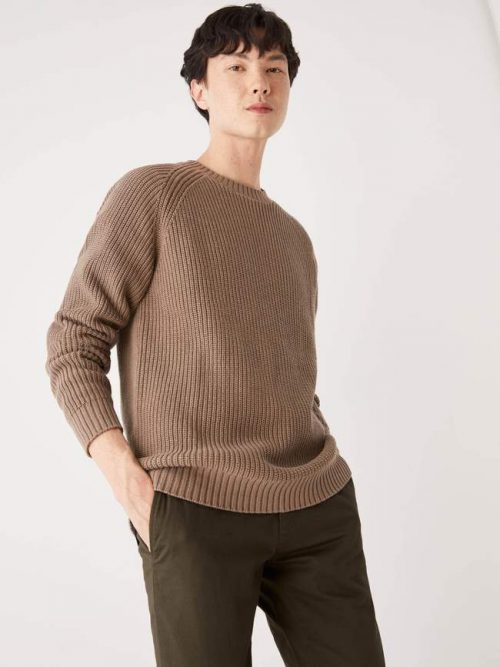

Price Range: $60 – $399
Size Range: 2XS-2XL
Materials: Organic cotton, wool, recycled synthetics
Another good option for men (and women!), Frank & Oak is a Canadian brand that makes thoughtful apparel for your wardrobe staples… and at pretty affordable prices, too.
They do use a lot of synthetic materials and blends, which is not ideal, but they at least it’s recycled. (They do have some 100% natural/organic sweaters as well.)
They have pullovers, button-ups, zip-ups, and more.
Amour Vert (Organic Cotton & Wool Sweaters for Women)
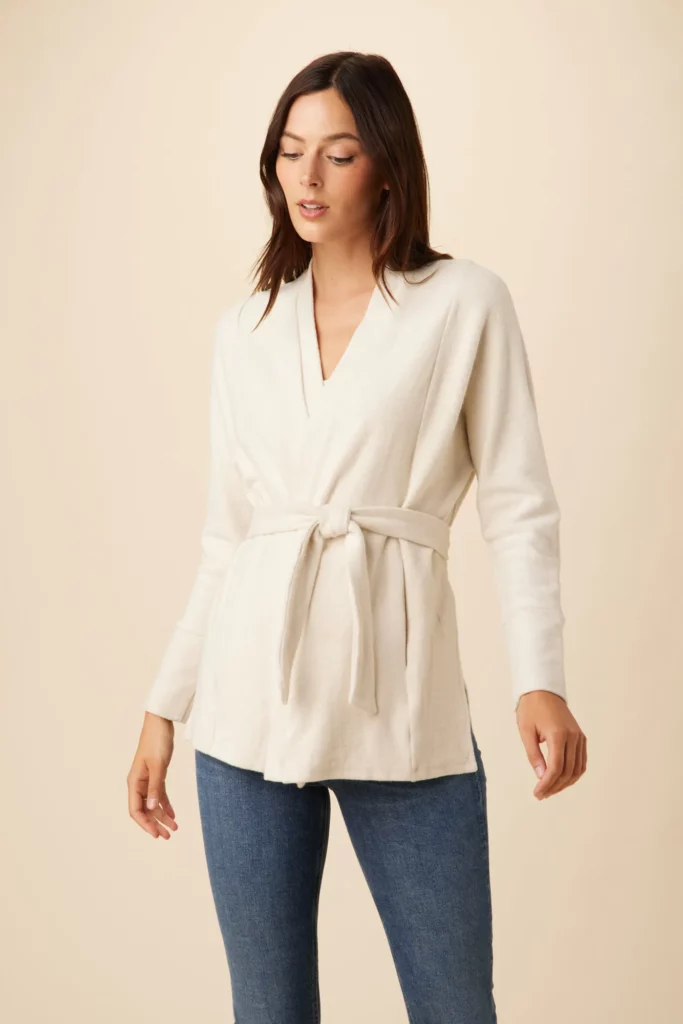
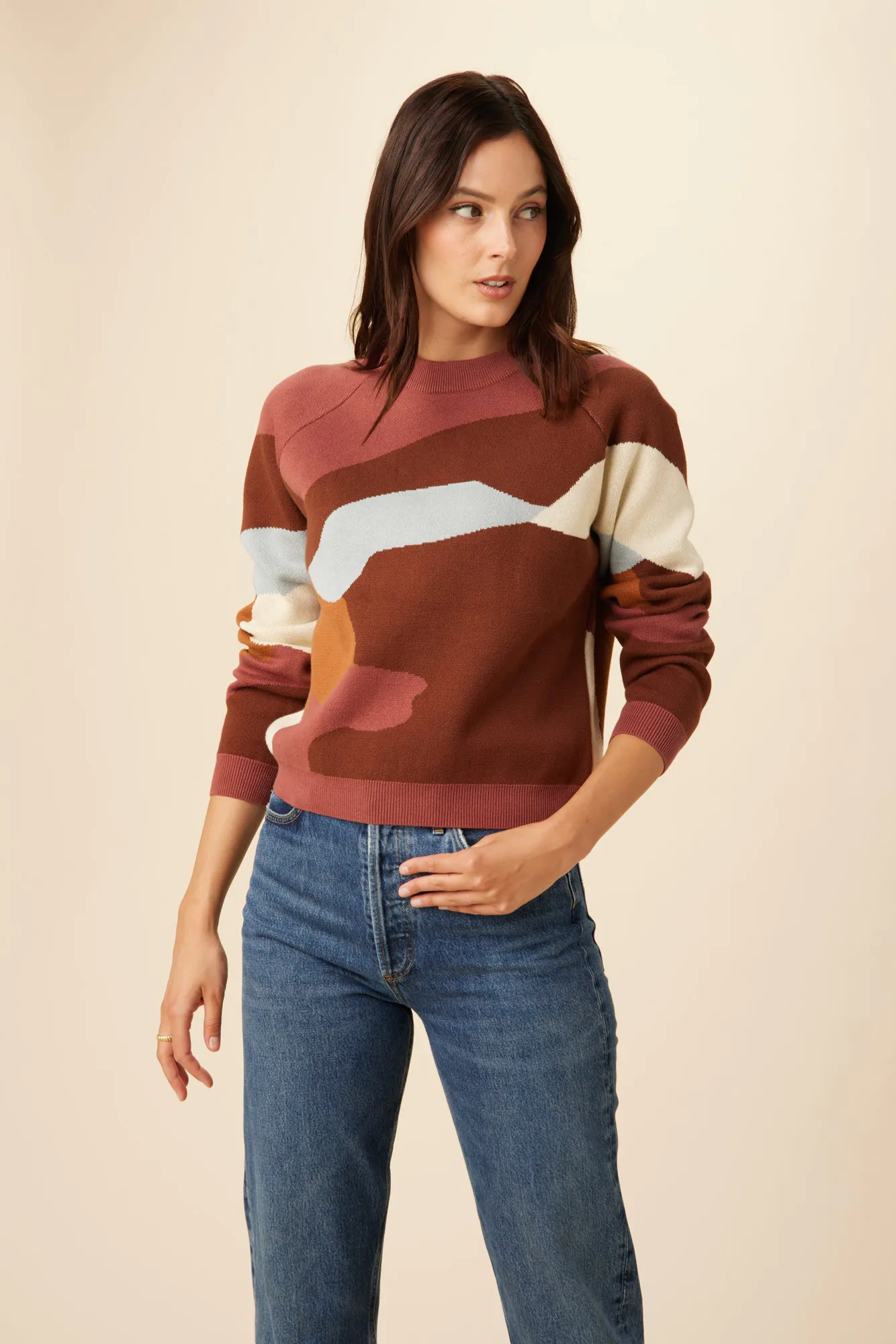
Price Range: $44 – $198
Size Range: XS-XL
Materials: Organic cotton, wool
Amour Vert uses materials like organic cotton and ethically sourced wool and to make their beautiful, sustainable women’s sweaters. They carry a variety of options, from patterned and solid-colored, pullovers and cardigans, fitted and oversized, cropped and wrapped.
Everything is ethically made in Los Angeles in small quantities in order to reduce waste, and trees are planted with each purchase!
Maisonette (Sweaters for Babies & Kids)
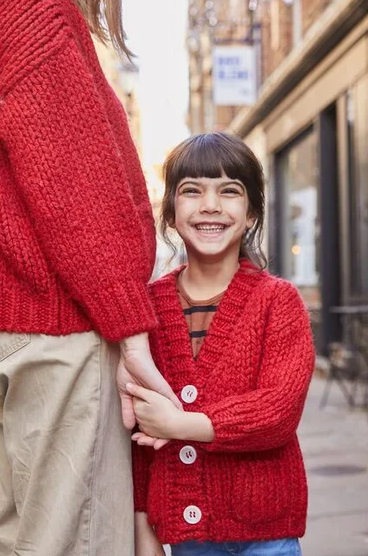
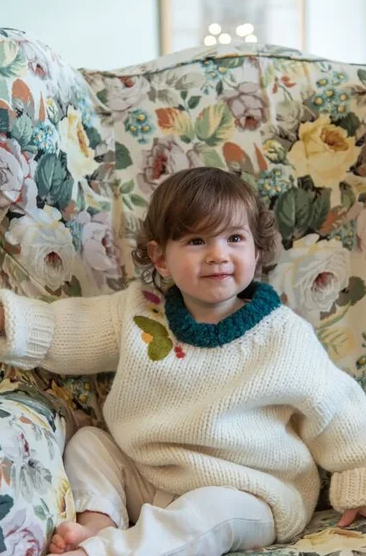
Price Range: $30-$320
Size Range: Wide range of sizes for babies, kids, and adults
Materials: Organic cotton, wool (& others)
Maisonette is one of our favorite online shops for thoughtfully curated products for little ones. They carry lots of super cute organic sweaters for both adults, babies, and kids from brands like Knot, Nonna Lietta, The Simple Folk, and more.
While Maisonette does carry a lot of organic, natural, and non-toxic products, they do have a lot of synthetics in their store as well. So just make sure you check each product page to get more details before you make a purchase.
Bare Knitwear (Natural Alpaca Wool Sweaters)
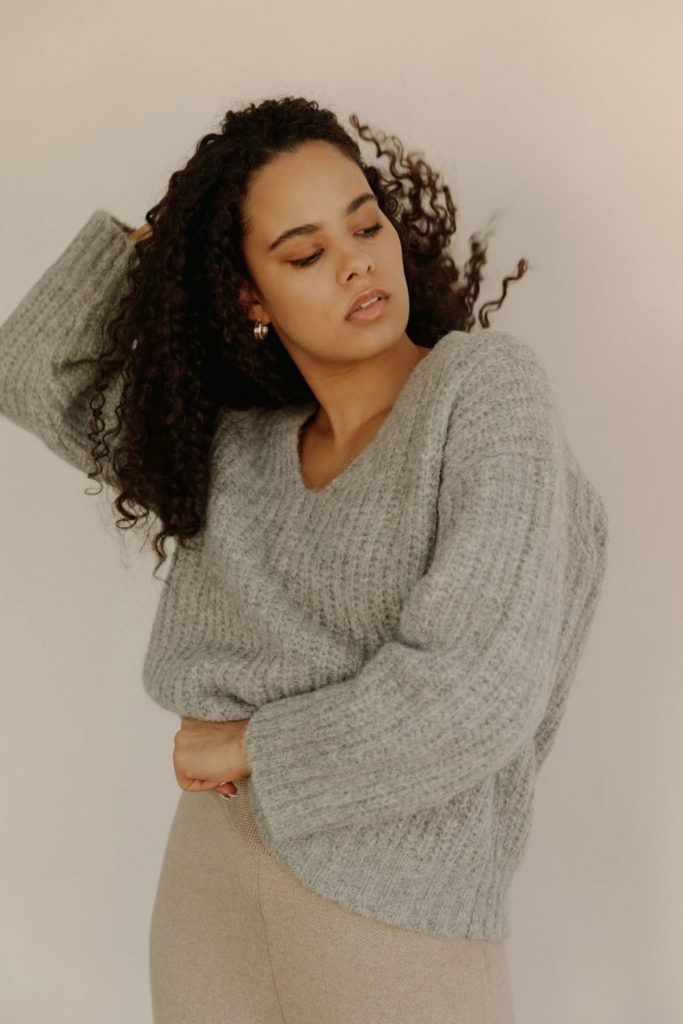
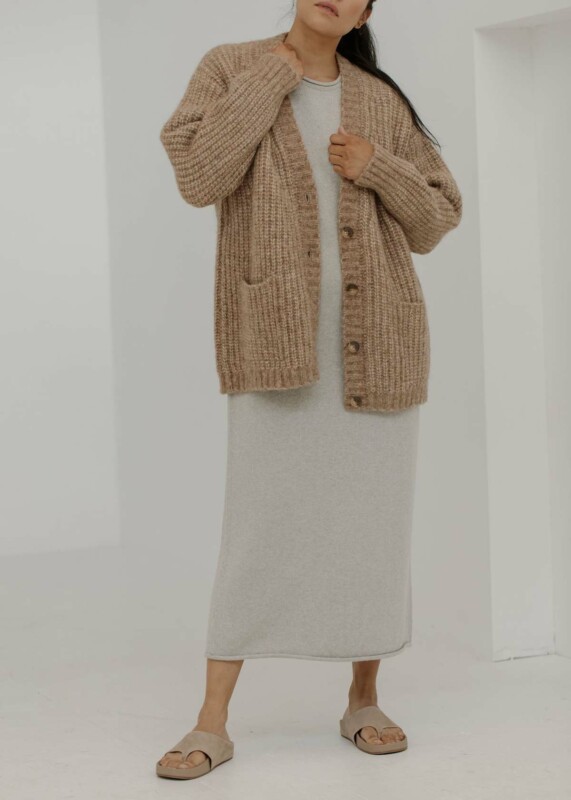
Price Range: $161 – $579
Size Range: XS – XL
Materials: Alpaca wool, cotton
Bare Knitwear’s sweaters are so luxurious! This brand offers timeless sweaters and cardigans in grays, creams, and blacks (most of them are undyed).
Some of them are made with 100% organic cotton, while others are blended with soft baby alpaca wool and/or pima cotton. All of their pieces are ethically made and several of them come with an OEKO-TEX certification, indicating it’s been tested for toxic chemicals.
They offer classic crew sweaters, oversized cardigans, quarter-zips, and more.
Seasalt Cornwall (UK-Based Organic Sweaters for Women)
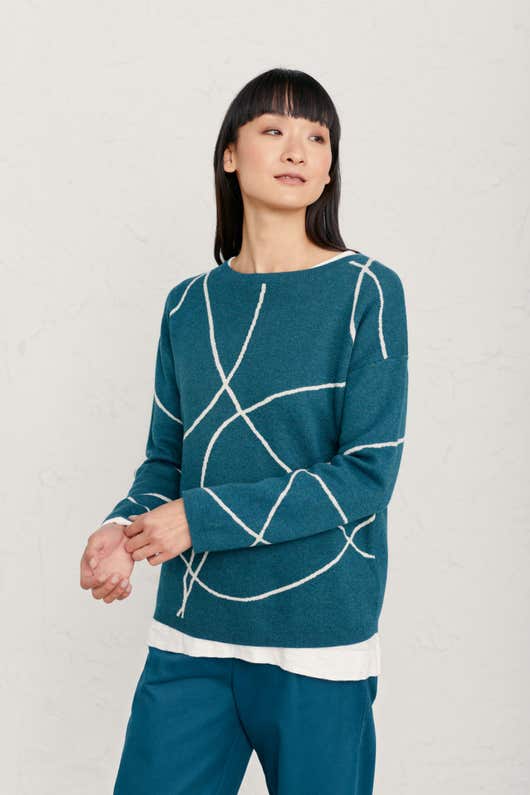
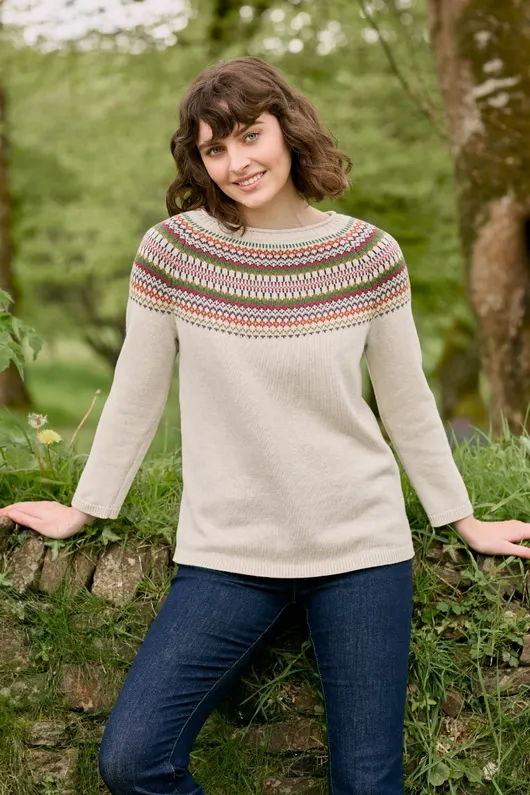
Price Range: $49-$105
Size Range: 6-28 / S – 2XL / Petite – Tall
Materials: Organic & conventional cotton, wool, recycled nylon
Based in the U.K., this ethical brand makes jumpers and cardigans (mostly for women, although they do have a couple of selections for men). They have some styles that are made with 100% cotton, while others are blended with wool and/or recycled nylon. You can shop from solid colors, patterns, turtlenecks, and more.
Why Buy Organic Sweaters and Cardigans? (What Fabrics & Finishes to Look For)
These days, a lot of sweaters are made out of synthetic materials like polyester and nylon. That means your sweaters are made out of plastic.
These materials can be problematic for a few different reasons. Some of them can contain chemicals that get dumped into our air and waterways during manufacturing, which is especially harmful for factory workers and surrounding communities.
Not only that, but as you wear and wash your synthetic clothing, they shed microplastics, which end up in our waterways and ecosystems and are nearly impossible to clean up and filter out.
These teeny tiny pieces of plastic can not only pose a threat to wildlife, but they actually have been found to end up all the way at the end of our food supply, harming humans as well.
Natural materials like cotton, wool, and TENCEL are a better option for the long-term health of consumers, our ecosystems, and the planet.
But since conventional cotton is grown using toxic pesticides and herbicides, organic cotton is even better. Organic cotton is grown and harvested without toxic synthetic chemicals, it requires less water to grow, and it is (almost always) sourced in a more ethical way in terms of the farmers involved.
Look for third-party labels such as the Global Organic Textile Standard (GOTS), which indicates the cotton and the finished product has been audited and verified to meet a specific set of standards.
What about animal-derived textiles like wool? Since these materials aren’t plants grown from the grown, the organic certification requirements are different from plant-based textiles like organic cotton.
Although wool doesn’t need any herbicides or pesticides to grow, you’ll want to look for brands that prioritize the ethical treatment of their animals throughout their entire life, and that the shearing process is done ethically and sustainably. Labels such as Responsible Wool Standard (RWS), Climate Beneficial, Fibershed, and PETA can help you identify wool that has been sourced ethically.
Kids
10 Brands for Organic Cotton & Wool Winter Hats & Beanies
Time to bundle up! I’ve rounded up the best brands for natural, non-toxic, and organic winter hats & beanies made out of things like organic cotton and wool for the winter 2024 season.
Non-Toxic Dyes & Finishes
There’s a lot that goes into making an article of clothing besides the raw material. That’s why you’ll also want to consider the dyes and and treatments used to finish the textiles as well.
Since many textile dyes can include toxic chemicals, you want to look for brands that use non-toxic, azo-free dyes whenever possible. These colorants are better for the wearer, the garment worker, and our ecosystems.
You’ll also want to avoid labels like “stain-resistant” or “iron-free,” which usually indicates that chemicals like PFAS or formaldehyde have been added.
Although third-party certifications such as OEKO-TEX as not foolproof, they are definitely helpful—so look for those, too.
Wrapping It Up
If you’re trying to reduce the amount of synthetic materials in your life and opt for organic and natural products instead, I hope this list of the best organic sweater brands has been helpful for you as you shop for new cold-weather clothing!
If you know of any amazing organic knitwear brands we’ve left out, let us know in the comments below and we’ll check them out.
And to stay updated about new guides, toxin news, and more, sign up for our weekly email!



